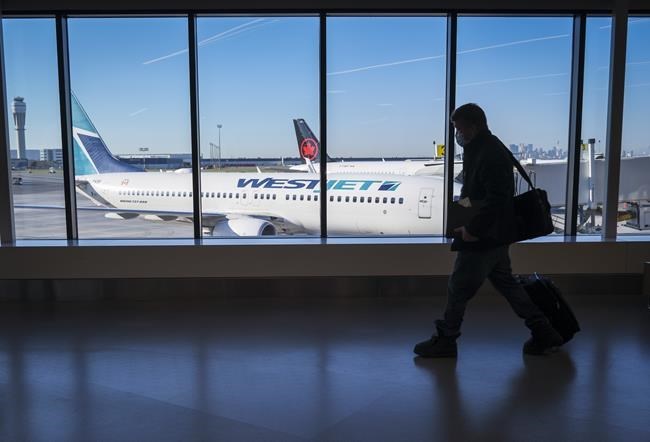Chad Rose was slated to take an afternoon flight from London, Ont., to Ottawa when WestJet cancelled his trip the day of.
The airline put him in a taxi to Toronto's Pearson airport during rush hour for an evening departure instead. But at midnight, it too was cancelled after an hours-long delay WestJet attributed to crew constraints, Rose said.
He received a food voucher for late-night airport fare, but no hotel coupons were left after an hour in line.
“I felt like Tom Hanks in 'The Terminal,' kind of wandering around aimlessly,” Rose said of the experience from June 2022.
After being rebooked on a flight the next day, Rose finally arrived in the capital more than 18 hours later than scheduled.
He filed a claim for compensation with WestJet, but the airline rejected it, saying the delays were for mechanical reasons and thus exempt from compensation requirements under the Air Passenger Protection Regulations.
For many, figuring out when and how to file for compensation — much less contesting an outcome — can be an unfamiliar and daunting task.
Compensation — distinct from reimbursement — is owed by an airline if a flight is cancelled less than 15 days before take-off or delayed by at least three hours for reasons within the carrier’s control. Crew shortages or routine technical issues qualify as within its control, while weather, security threats and strikes do not.
A cause that is “required for safety purposes,” such as mechanical problems, also does not require compensation, according to the regulations. However, the rights charter is currently being overhauled, including this provision.
"'Technical issues' are more tricky — it is always within the carrier's control, but depending on whether it was unexpected or not, it may or may not be classified as a 'safety' issue under the APPR," said Air Passenger Rights advocacy group president Gabor Lukacs.
Assuming the reason was within the airline’s control, travellers are entitled to $400 if a flight arrives three or more hours late, $700 if it lands six hours late, and $1,000 if it touches down nine-plus hours late. For smaller airlines such as Lynx Air and Canadian North, lower amounts are mandated. Air Canada, WestJet, Air Transat and Flair Airlines are all classified as large.
To apply for compensation, a simple web search with the words “compensation claim” followed by the name of the airline should bring up a link to the company site where customers can fill out a form.
Airlines have 30 days to reply, and must include an explanation for a rejection. If the claim, which must be filed within a year of the flight disruption, is turned down, travellers have several options.
One is to submit a complaint online to the Canadian Transportation Agency. The process includes an eligibility review by a complaints resolution officer, who then leads a mediation stage — if both parties agree — that can result in a compensation deal.
Should an agreement fail to materialize, the mediator will issue a final decision within 90 days of the start of the process. However, the complaints backlog is so long — 63,600 as of Jan. 10 — that it can take a year-and-a-half for the process to “start.”
A second option is to go to small claims court, after or instead of the transportation agency. While no guarantee of success, this avenue results in quicker and sometimes bigger compensation, according to Lukacs.
He and other advocates have expressed concern that the CTA tends to favour airlines over customers.
“Even in provinces where there's a long (court) backlog, still,it's faster than going to the CTA,” said Lukacs, whose organization offers online guides on how to navigate complaints.
“But ultimately, each person needs to make their own decision on this.”
For passengers who are turned away at the gate — usually because the flight is oversold — an airline must pay $900, $1,800 or $2,400, depending on whether they arrive at least three, six, or nine hours late at their destination.
In all denied boarding cases within the airline's control — except those required for safety, such as a seat malfunction — the airline must compensate travellers for the inconvenience.
Rose said he was frustrated, but undeterred: “The ego and principle side of me wanted to fight this to the end."
After filing a lawsuit, he eventually settled with the airline, signing a non-disclosure agreement in the process. (WestJet has said it does not comment on NDAs.)
If luggage takes more than 21 days to be returned — at which point it qualifies as lost — passengers can file a claim that spells out the costs resulting from the missing items during that period, up to $2,350.
Late or damaged baggage can yield compensation up to the same amount. However, the airline does not have to pay if the damage resulted from the quality or "inherent defect" of the luggage, according to the Montreal Convention, a multilateral treaty on liability and compensation for air travellers. A claim on damaged items must be filed within seven days, and on late bags within three weeks of their return.
Meanwhile, customers are also entitled to a refund when the airline cancels a flight or delays it three-plus hours. Separate from any potential compensation, the refund kicks in if they opt not to re-book the cancelled trip or accept the tardy takeoff.
Guests can typically make the request at a service counter in the airport or at the website of the carrier or travel agency where the flight was booked. Rejection of this demand leaves passengers with the same options they have when seeking compensation: filing via the transportation agency or the courts.
This report by The Canadian Press was first published Jan. 18, 2024.
Companies in this story: (TSX:AC)
Christopher Reynolds, The Canadian Press



